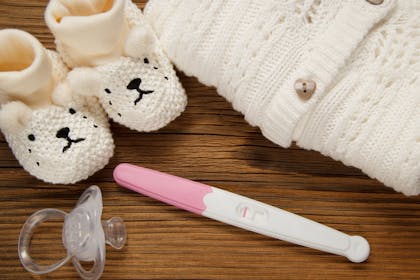Are you trying for a baby but got confused when your ovulation test kit showed a faint line? You may be wondering: could I be pregnant? Keep reading to find out how ovulation kits work
If you're trying to get pregnant and your ovulation test is showing a faint line you may be confused and wonder if it means that you're pregnant.
It's common for women to wonder if an ovulation test can detect pregnancy . Ovulation tests are so similar to home pregnancy tests, after all.
In this article we'll explore how ovulation tests work , establish what a faint line on an ovulation test means , what could cause a faint line on an ovulation test and whether a faint line could mean pregnancy.
FREE NEWBORN NAPPIES
Keep reading through to the end for some handy tips for accurate ovulation test results!
How do ovulation tests work?
If you're trying to get pregnant, you'll know that ovulation tests calculate when you are ovulating. They help you work out the optimal time to have sex in order to fertilise the egg as soon as it is released from the ovaries – therefore, giving you the highest chance to get pregnant.
Taking an ovulation test is like taking a pregnancy test – but a pregnancy test detects hCG, the pregnancy hormone, after a missed period.
Ovulation tests work by detecting luteinising hormone (LH) levels in the urine. LH is a hormone that is produced by the pituitary gland. It's responsible for triggering the release of an egg from the ovary, so LH levels surge just before ovulation and this is what the ovulation test picks up.
Like pregnancy tests, an ovulation test kit typically consists of a test strip that you dip into a cup of your urine or a stick that you hold in your urine stream. The results are read within a short timeframe, according to the instructions of your kit – usually a few minutes.
What does 2 lines on an ovulation test mean?
Ovulation test results are displayed with 2 lines:
- One is the control line – this will always appear in order to show that the test is functioning as it should.
- The second line is the results line – this one usually shows up darker than the control line. It's a positive result and means you're about to ovulate.
With a positive result, ovulation is likely to occur in the next 12-36 hours.
What does a faint line on an ovulation test mean?
So what does it mean if you've done an ovulation test but only a faint second line shows up? We all know it should be dark if we're due to ovulate, right?
It's common for women who are having unprotected sex to wonder if the line is faint because they could actually be pregnant.
A faint line on an ovulation test shows that there is a small mount of LH in the urine, but not enough to trigger a positive result. There are always low levels of LH in your body though, so it makes perfect sense for a faint line to appear.
If you get a faint line on your ovulation test, it's read as a negative result or a low LH surge. It means that you're likely not ovulating at that moment.
But why are you getting a 'not ovulating' result?
What causes a faint line on an ovulation test?
Here are the scenarios in which a faint line might appear on your ovulation strip when ...
- You're early in your cycle – If you take an ovulation test early in your cycle, there will be lower levels of LH in your body. Remember LH is always present and gradually increases leading up to ovulation.
- You're mid-cycle – If you're still in the early stages of your cycle, LH levels may only just be starting to rise. However, if you get a faint line it doesn't necessarily mean that ovulation is going to occur as LH levels could very well plateau.
- You're late in your cycle – If you take an ovulation test late in your cycle and you get a faint line, it could, rarely, indicate that you're pregnant if you've already been having unprotected sex. LH levels decrease shortly after ovulation.
- If you've taken multiple tests throughout your cycle, and the test line is always fainter than the control line , speak to your GP. It could be possible you have a hormonal imbalance or other condition affecting your ovulation. The sooner you treat any ovulation issues, the better.
Can ovulation tests detect pregnancy?
Keep in mind that ovulation tests aren't designed to detect pregnancy. Pregnancy tests work by detecting levels of the pregnancy hormone hCG in the urine, which is produced by the placenta after implantation, whereas ovulation tests detect LH levels.
However, hCG and LH are chemically similar, so ovulation tests may pick up on hCG in the urine. This is why some women wonder if a faint line on an ovulation test could mean that they're pregnant.
It's not a reliable way to confirm pregnancy, unfortunately, so if you have missed your period or you're experiencing early pregnancy symptoms, you should always use a proper pregnancy test. Follow the instructions on the box carefully in order to ensure accurate results.
Tips for accurate ovulation test results
- Read the instructions for the ovulation kit carefully before using it. Different manufacturers or brands may work slightly differently.
- Ask your doctor if any medications you're on might interfere with your results. This is especially applicable to hormonal medications. Your doctor may be able to offer alternatives.
- There is no need to restrict your diet before taking an ovulation test. Food and drink, including alcohol, will not affect the results ...
- ... However, you should reduce your intake of liquids about two hours before you take an ovulation test.
- The best time to take an ovulation test is between 10 am and 8 pm. LH is synthesised in the body in the morning and therefore may not appear in your urine until later in the day. This is why it is not recommended to take your test in the morning.
- For more accurate results you should try to take your ovulation test around the same time each day.
- Using an ovulation test strip with a digital readout can eliminate any confusion over faint lines.
Related stories
What the faint line on your ovulation test really means







